Forget Buffalo wings and chili. Bring on the goat meat and chapatis.
A few months before I moved to Minneapolis, I stopped at a gas station while visiting the city looking for a place to eat. The cashier and two customers—all of whom were Somali—conferred for a minute, then pointed me up the street to a building that didn’t look much like a restaurant. The windows were dark and the façade was strange, but high on the roof was a sign that read: Qoraxlow Restaurant #1 African and American Cuisine.
I walked inside. The place was run down: a giant TV played CNN, there were no menus, and the credit-card machine was broken. But once the door closed, the sound of talking and laughing, and the smell of rice and goat meat, brought me straight back to East Africa. I’ve never tired of eating at Qoraxlow since.
That was nearly a decade ago. Somalis had started landing in Minneapolis in force a few years earlier. After the Somali civil war started in 1991, people came to Minnesota to work in meat-packing jobs in the western part of the state. By 2010, according to Ahmed Ismail Yusuf, author of Somalis in Minnesota, their numbers had grown to somewhere between 36,000 (the U.S. census number) and 70,000 (the community’s estimate). Before long, you could find places like Qoraxlow across Minneapolis. For someone like myself, with young kids and little extra money for the kind of globetrotting I did when I was younger, these places felt like an escape. Sometimes I would meet old Somali men who spoke Italian and young ones who spoke Swahili. I could eat sambusas and drink chai and feel refreshingly far from home.
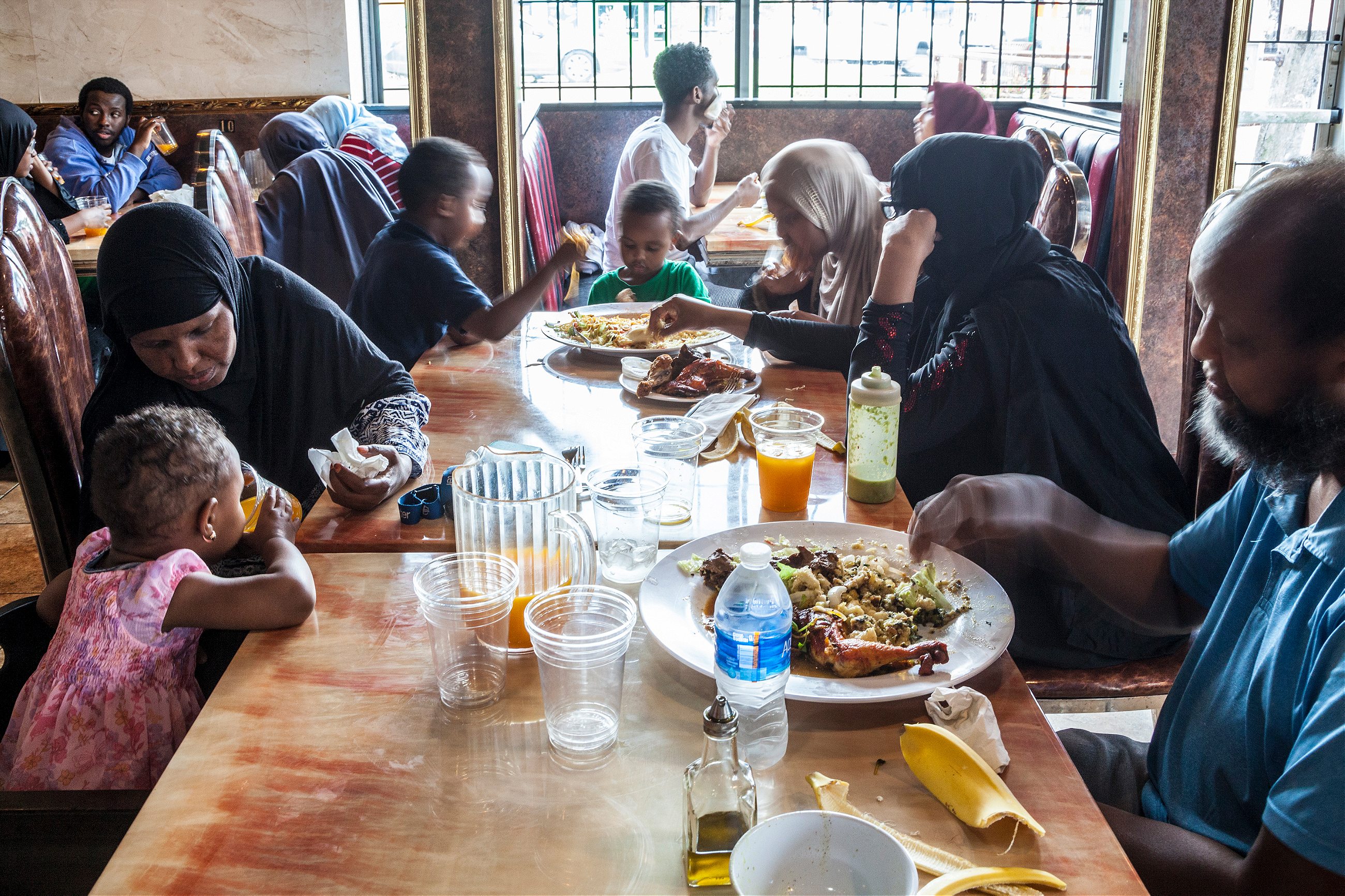
One of the central spots in this community was Karmel Square, a massive Somali mall that felt like a peaceful and prosperous Mogadishu market. It was full of bright-colored fabrics, wafting incense and perfume, cheap sandals for sale, and bookstores that only sold the Koran. This complex—the Suuqa Karmel, as was written on one side—was built in the early 2000s by a charismatic property developer named Basim Sabri, who had immigrated from Palestine. Subsequently, Sabri spent a few years in prison for trying to bribe a Minneapolis city council member, but, notwithstanding his legal woes, his mall has continued to thrive.
A few years ago, I stopped by Karmel Square to interview Sabri. He told me he’d just bought the building, which had sat empty for 20 years, when two guys from Somalia walked in and asked if there was going to be a coffee shop there. Sabri said, “sure,” then gave the guys a break on rent to open one. Soon, the mall was so full that he built another, bigger building next door, which now houses at least 175 businesses: shops, grocery stores, a mosque, a learning center, a day care. It also houses the second and third locations of Qoraxlow. Today it has a third floor (which collapsed once during construction). The Qoraxlow in Karmel Square is crammed into an odd corner of the building. The walls are covered in steel plating, and painted above where the metal ends. Sometimes when you show up for lunch, the food isn’t ready. Sometimes, you just have to eat whatever has been cooked.
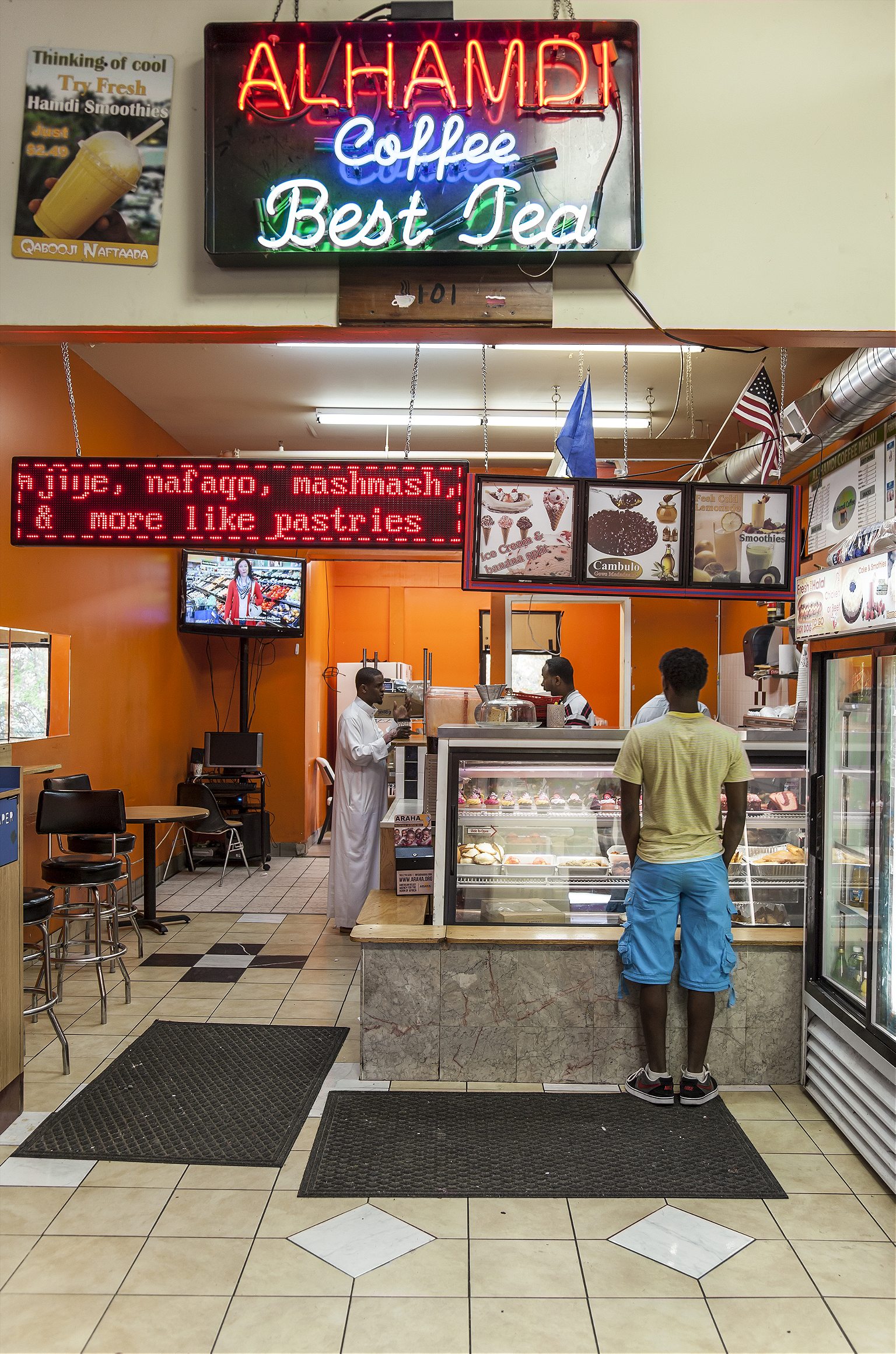
You won’t find Qoraxlow on a list of the city’s best restaurants, even though it is among them. When some of my travel-writer friends visited Minneapolis, we bypassed the artisanal cocktail scene and headed over to the Karmel Square, where we ordered a kind of chopped up cooked chapati called “KK” that almost tastes like a pasta, goat meat so tender it falls from the bone, rice cooked with cinnamon and raisins, sweet and tangy chicken suqaar among other dishes.
Like many Americans, they’d never tried Somali cuisine, and rarely get to eat goat meat, but raved about it afterward. This is often the case with food from East and West Africa, where I’ve had of the best meals of my life. I remember the dishes clearly: the bowl of rich egusi soup at a roadside stand in the middle of Nigeria, studded with tender beef; the tangy tomato mafe at a small restaurant in Dakar, Senegal; the succulent skewers of nyama choma (“cooked meat”) at a garden restaurant in Tanzania; the fresh roasted goat meat wrapped in newspaper at a bus stop in Burkina Faso.
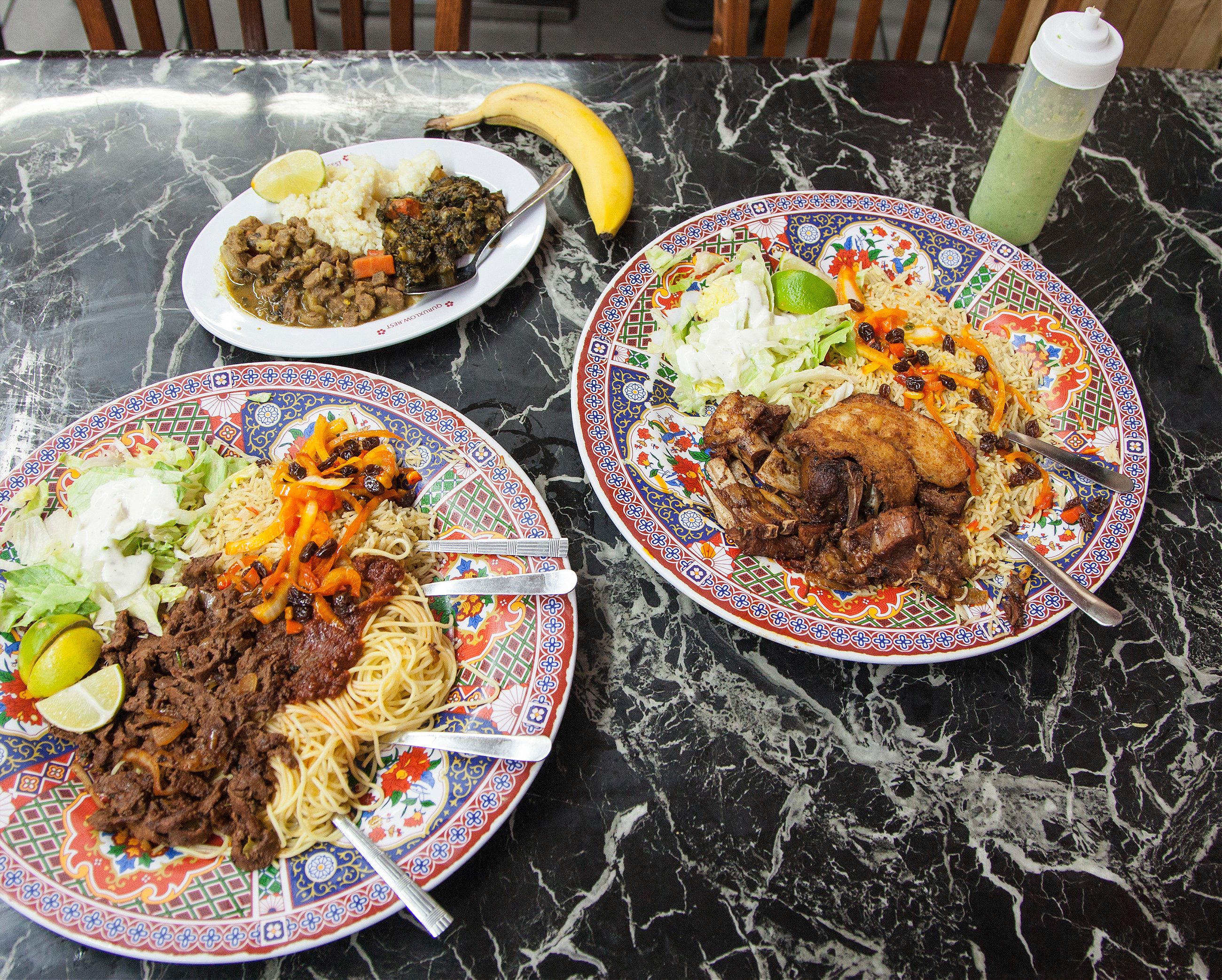
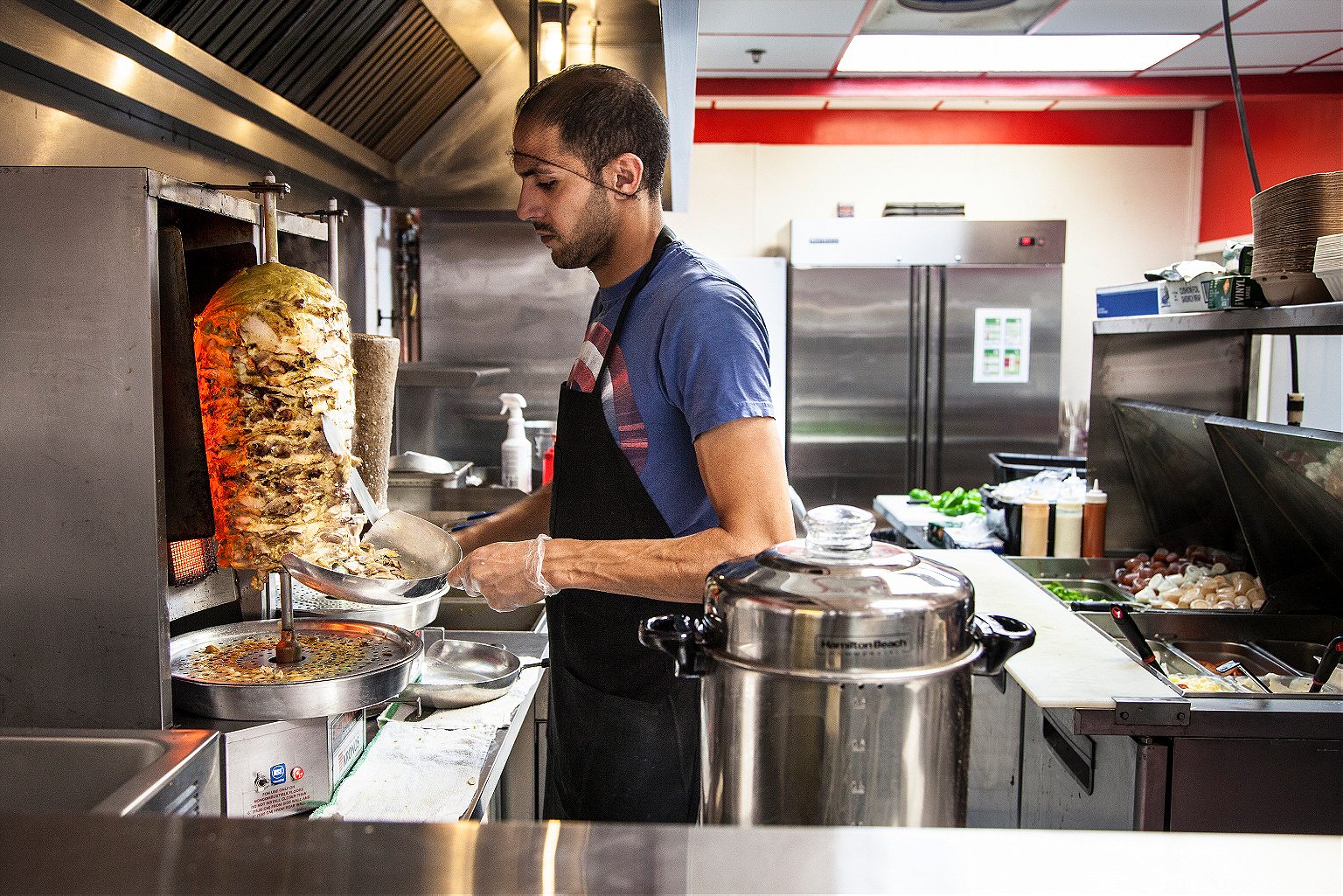
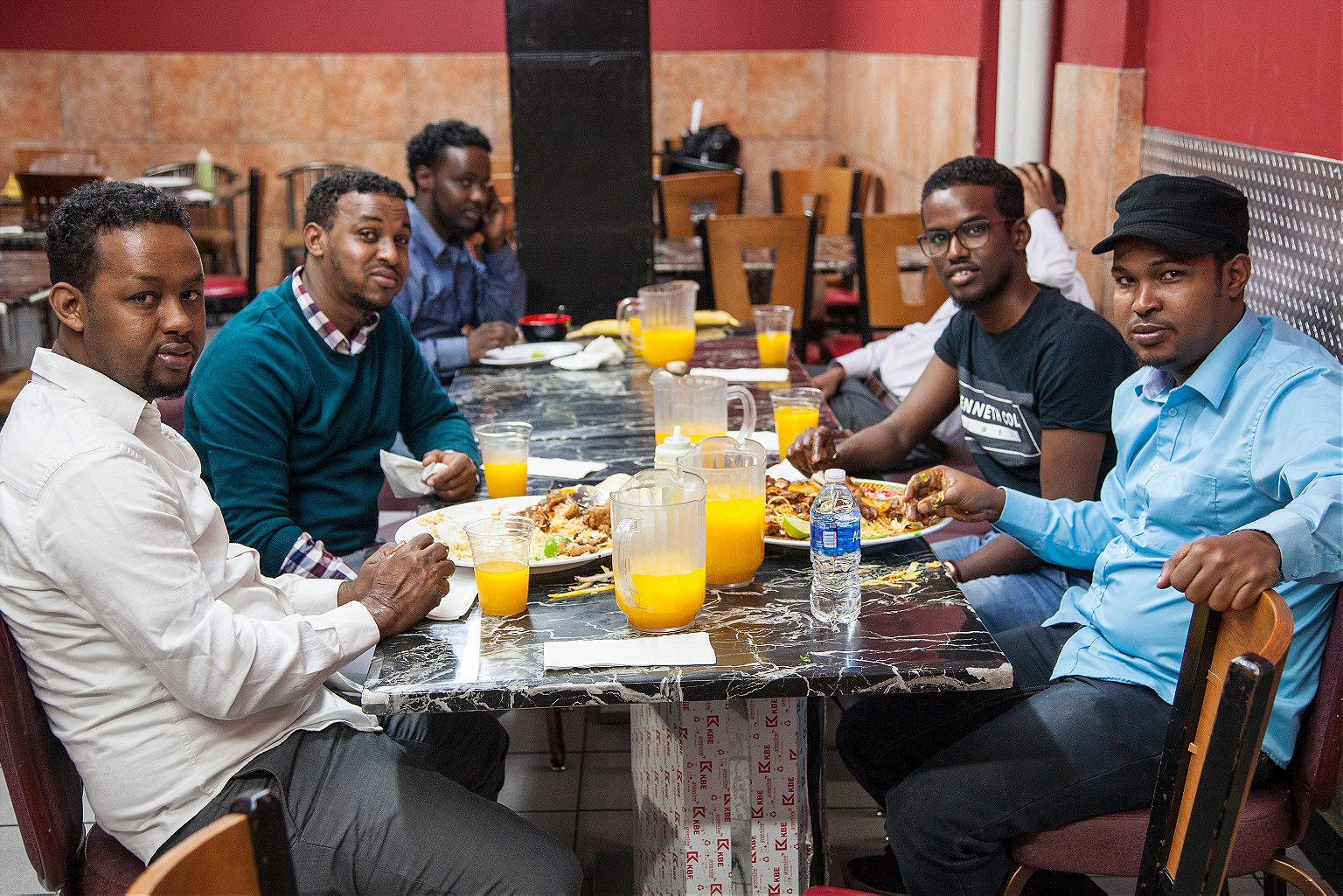
I keep waiting for these cuisines to take off in the U.S., but they remain sadly overlooked. Maybe that will change: in Paris, it’s now acknowledged that some of the best food in the city is not from France, but from the former colonies of Ivory Coast, Mali, Senegal, and elsewhere.
Or maybe not. Americans have become picky eaters, and most of these places are hidden in suburbs and strip malls. Usually there is no aggressive theme or enticing decor. There is little coddling of customers: You have to ask for menus and silverware. Rather, they are just about the food, which is often served on giant plates for the table.
Qoraxlow has continued to expand, and in the process, has gotten fancy. The old, beat-up location shut down this year, and a shiny new one opened a few blocks down the street. When I stopped in to see the place, it had much more panache. The new dining room is filled with mirrors, shiny tiles, and photos of nomads back home. Customers sit at faux-marble tables in cushy wing-back chairs. There is a giant fish tank filled with paper fish and a huge watch hanging on the wall behind the counter. It is opulent in a particular way, a façade of affluence shellacked on more modest foundations, like Mobutu’s palace or Trump’s living room. As in the other Qoraxlow locations, there are two dining sections so that men and women can eat separately, though non-Somalis (and more liberal Somalis) sit where they like.
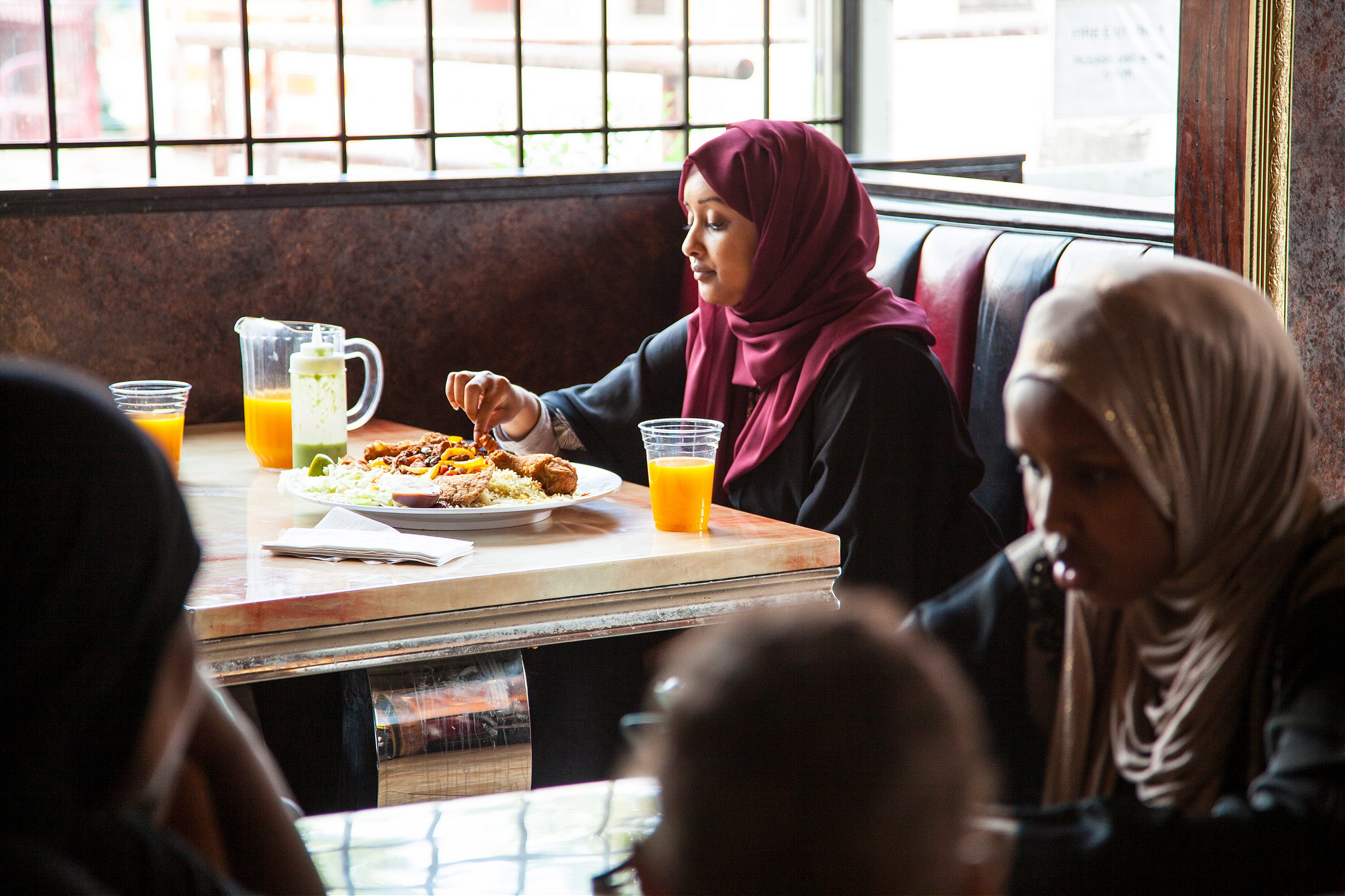
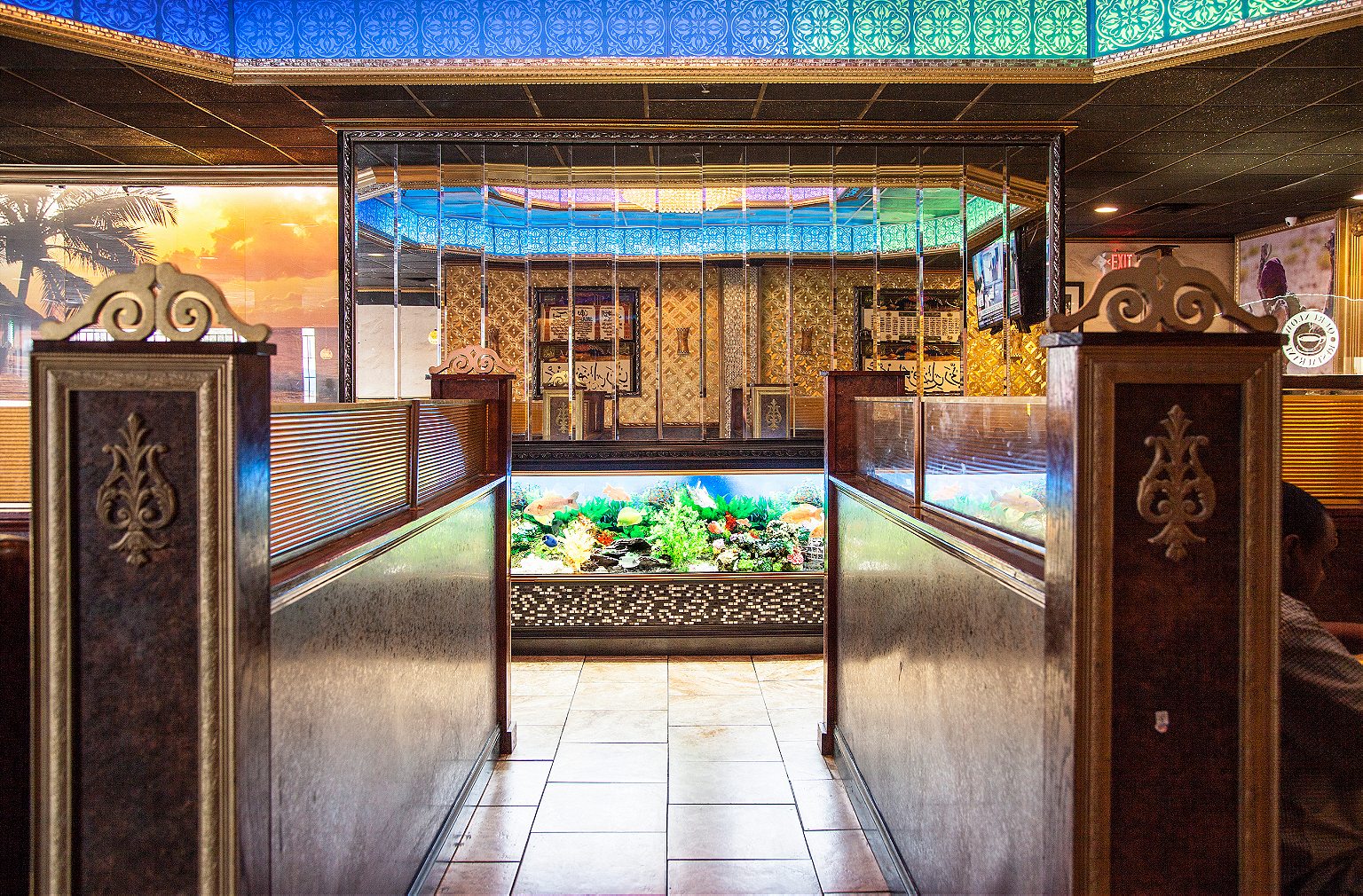
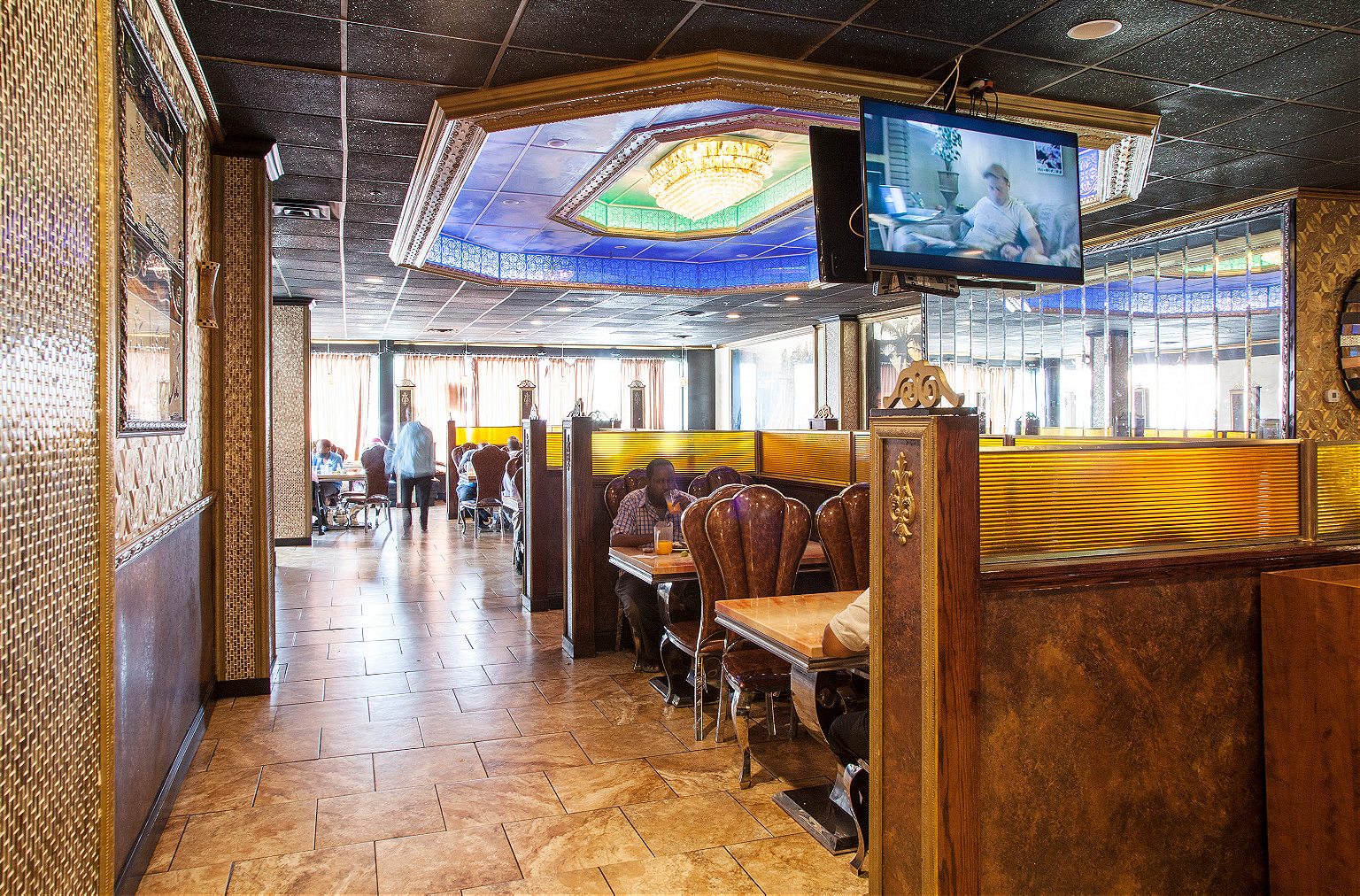
The new sign on the building says, Quruxlow in giant red letters—a different spelling, which is perhaps not surprising given the oral nature of Somali culture. (The language wasn’t written down until 1972.) Eventually, I track down the manager, Adbullahi “Food” Ibrahim, a dapper young guy, whose nickname is only incidentally related to his job. (It means “forehead” in Somali).
“People know Quruxlow,” he says. “Across the country. Even the world. Somalis, they come here from Europe to eat.”
Ibrahim was born in Mogadishu and arrived in Minneapolis in 2009, after an epic journey. “I was living in Nairobi,” he says. “Then I went to Ethiopia, to Dubai and then to Russia. From Russia, I went to Cuba. From Cuba to Ecuador. Then all the way, through Latin America: Columbia, Panama, Costa Rica, Nicaragua, all the way to Tijuana. I told them I was traveling for two years. I was an asylum seeker.”
When Ibrahim came to Minneapolis, he first started driving for Uber, then got a job at Quruxlow: first as a cashier, then doing delivery, and now, finally, as manager. He has a wife and a new baby boy, and dutifully checks in with U.S. immigration, each time hoping he’ll be able to stay with them.
We talked for a while before he introduced me to Lulu Quruxlow, who is the force behind the whole operation. “These are my own recipes,” she tells me. “The KK is my own recipe. The rice, with the onions and raisins, is my own recipe. Also, the mufo, is my own recipe.”
Her recipes are from her hometown of Merka, near Mogadishu, and if there’s any regional bias to the cuisine, people don’t seem to mind. The restaurant is always full at lunch. While I’m at the counter, standing next to me is a group of girls chattering in English as they buy halwa (a rich, jelly-like sweet popular in Somalia, and for which Quruxlow is known). There’s a young guy from Nairobi studying microbiology at the University of Minnesota, who comes here to eat often.
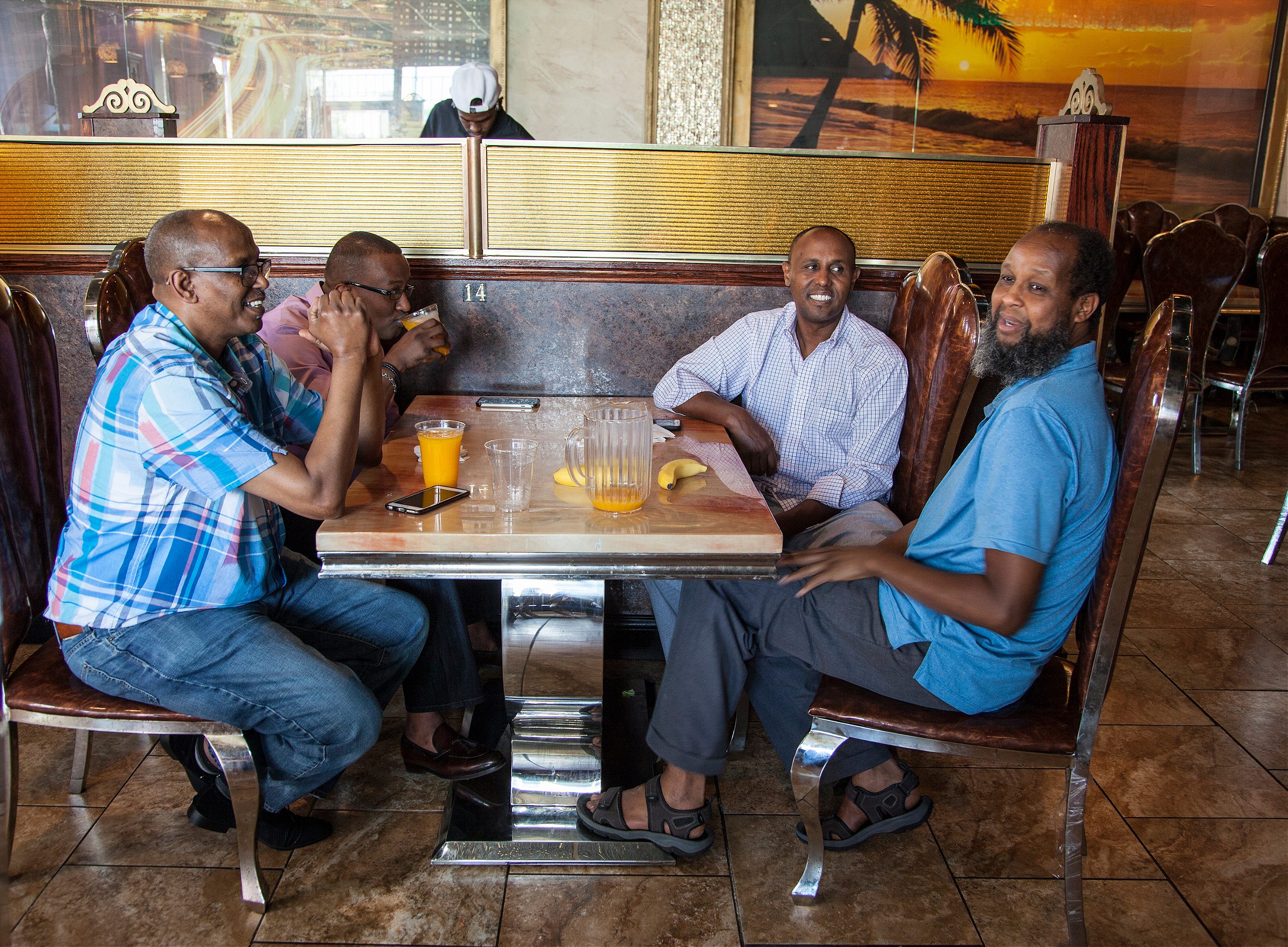
Many Somalis have gone back to Somalia in recent years, as the central government has become more stable, and the road to citizenship in America has gotten rougher. Last year, some young Somali men were convicted of conspiring to help the terrorist organization Al Shabab, and a bomb was set off at a mosque in a Minneapolis suburb, an echo of the bombs asylum seekers fled in Somalia, including one recently detonated in Mogadishu that killed more than 300 people, including a father of three from Minnesota. That attack may slow the return, but it won’t stop it. In light off all that, Quruxlow feels like a kind of oasis.
I sit down across from three middle-aged men, talking and waiting for their food. When their orders come, I stop by their table to chat. They tell me they live an hour away, and come to Quruxlow once a week.
“There’s no Somali restaurant in your town?” I ask.
“There is!” one of them says. He points across the table, “He’s the owner.”
“That’s right,” says his friend. “I am the owner. But I stop by here every week. Karibu,” he says, which means “welcome” in Swahili. He gestures to the table and invites me to share their food. I say thank you, but that I’ve already eaten well.
The goat meat may be one reason I love Quruxlow, but this is another. Being there reminds me of the places I’ve been where food is more than just a fuel, and where meals, even with strangers, are meant to be shared from the same dish.